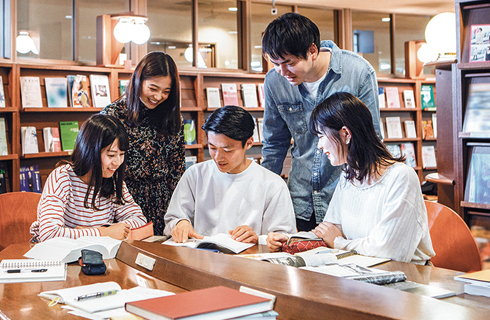Department of Sociology
Department of Sociology
Department of Social Work

Examining connections between people and society from various different angles
Sociology is a discipline that reveals the mechanisms at work in our society. The Department of Sociology develops our students’ ability to think flexibly and express themselves creatively via a curriculum that is based around small classes and face-to-face interactions. Our professors are prominent in their fields and watch over the efforts of each of our students as they explore various issues.
Department of Sociology
Key Features of the Department of Sociology
Program Structure
Topics
Admission Policy
Key Features of the Department of Sociology
Point 01
A structured sociology curriculum
Our curriculum provides students with a structured study of sociology. In their first and second years, students learn fundamentals through interactive small-group seminars such as Academic Literacy, Introductory Seminar in Sociology, and Intermediate Seminar, and through lectures such as Foundations of Sociological Theory. In their third and fourth years, students enroll in Advanced Seminar 1 and 2, where they learn more deeply within their specialization according to their research interests.
Point 02
A fieldwork-centered approach that nurtures the skills and spirit of social research
The heart of sociology lies in examining actual societies, understanding them more deeply through questionnaires, interviews, observations, and document analyses. Students learn professional social research methods and ethics from their first year. We also offer the Certified Social Researcher accreditation classes required by the Japanese Association for Social Research (JASR) for certification.
Point 03
Three specialization courses allow students to discover their own research topic
Students choose one of three specialization courses in their second year, allowing them to interact with others having similar study interests, deepen their knowledge and discover a topic for their own research. Our course system also permits students to take classes from other courses, allowing for flexible study plans that accommodate students as their interests broaden and change.
- Culture and Media Course
Students explore the production and communication of information and its impacts with the goal of understanding their own culture and that of others. - Life and Identity Course
Students gain an understanding of connections between human life and society to investigate the nature of contemporary societies built on advanced science and technology. - Environment and Community Course
Students gain an understanding of relationships between events in their everyday lives and communities, cities, and the world, while also developing the practical skills needed to create sustainable new communities.
Point 04
Instruction on expression and practical methods from media professionals
Research and writing papers are not the only ways we apply sociological practices to social phenomena and issues. Lectures and workshops from visiting lecturers active in media industries such as broadcasting, publishing, and advertising provide students with abilities to express their views through media.
Program Structure
In their first year, students learn basic knowledge and methods for sociology and social research through small group seminars and social research classes. In their second year, students choose one of the three specialization courses, concentrating on an academic area of interest. In their third and fourth years, students choose Advanced Seminars 1 and 2 to more deeply pursue their academic interests. Building on the knowledge and experiences gained through those Advanced Seminar 1 and 2 and the Practical Training in Social Research, they write a graduation thesis.
Topics
Practical Training in Social Research
According to their interests, students choose from among classes covering various research topics and methods such as interviews and questionnaires, and through practical training learn the entire research process, from initial planning to report writing. This key course, available in the third year, is also a requirement for the Social Researcher Certificate.
Media Creativity Workshop
The Department of Sociology invites media professionals in broadcasting, publishing, advertising and digital media creative industries as visiting lecturers. These practical classes help students gain media expression skills, facilitating their career development. In addition to visual expression classes, there are classes on advertising and marketing, planning, and written expression.

